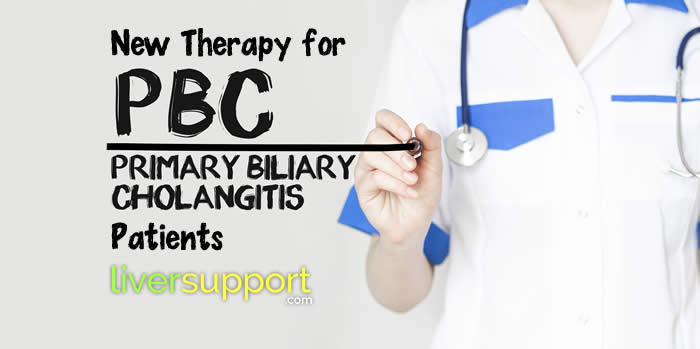
Previous
FDA Clears New Technology for Early Liver Disease Diagnosis

Next
Xanthelasma: When Heart Health Meets Liver Health
New Therapy for Primary Biliary Cholangitis Patients
Learn about a new therapy called Obeticholic Acid, that offers primary biliary cholangitis patients up to 80% lower risk of liver transplant or death.
While hepatitis C, nonalcoholic fatty liver disease, and cirrhosis are some of the better-known diseases impacting the liver, studies have found that primary biliary cholangitis, or PBC, is on the rise. (1) Though there is currently no cure for this liver disease, one new treatment shows promise for reducing the risk of liver transplant or death in people who are diagnosed with this condition.
What Is Primary Biliary Cholangitis (PBC)?
In primary biliary cholangitis, the bile ducts—which are responsible for transporting bile, a fluid that aids in digestion, to other organs—become damaged. This forces bile to build up in the liver, eventually causing scarring or cirrhosis.
In fact, PBC was previously known as primary biliary cirrhosis. This disease impacts women more often than men and is often diagnosed a bit later in life, generally between the ages of 35 and 60. (2)
PBC is a progressive disease with no known cure at this time. That said, there are treatments available that aim to slow its progression, potentially saving the patient from liver failure or death. One of the newest treatments that is showing positive results for PBC is obeticholic acid (OCA).
Obeticholic Acid (OCA) for PBC: The Research

On November 15, 2021, Intercept Pharmaceuticals, which manufactures the drug OCALIVA, revealed that the results of the POISE long-term safety extension study were in. This study analyzed data on 209 people with PBC, all of whom were given OCA as a form of treatment. (3) The data was then compared to data collected on patients elsewhere in the world not previously treated with OCA.
Based on the results of this comparison, it was determined that individuals who received OCA had between a 72% and 80% lower risk of liver transplant or death during the follow-up period (up to 6.3 years) than subjects not receiving this treatment.
And this reduced risk remained regardless of:
- age
- sex
- how long the patient had PBC
- and other potentially impacting factors.
Previous research, such as a study published in the journal Pharmaceuticals in 2018, suggests that OCA may also be beneficial for people diagnosed with other liver diseases, such as nonalcoholic steatohepatitis or NASH. (4) Authors of another study indicate that people diagnosed with nonalcoholic fatty liver disease (NAFLD) might benefit from this treatment as well. (5)
How OBC Works
The National Institute of Health (NIH) explains that OBC is a farnesoid X receptor agonist. (6) This means that it is designed to regulate genes involved in bile synthesis and transport.
This category of drug works in two ways.
- One, it decreases the production of bile in the liver.
- Two, it also increases the removal of the bile that is produced.
While OBC can be prescribed as a stand-alone drug, it is also sometimes used in conjunction with ursodiol. Ursodiol is a gallstone dissolution agent that dissolves bile cholesterol and decreases bile acids that have accumulated to toxic levels. (7)
Is OBC Right for You?
If you have been diagnosed with primary biliary cholangitis, talk to your doctor to discuss whether OCA may be right for you based on your physical condition and health status. Together, you can determine whether this treatment could help slow the progression of your PBC and its potential effects.
(1) Lu, M., Zhou, Y., Haller, I., et al. (2018, August). Increasing Prevalence of Primary Biliary Cholangitis and Reduced Mortality With Treatment. Clinical Gastroenterology and Hepatology. doi:https://doi.org/10.1016/j.cgh.2017.12.033
(2) Cleveland Clinic. (2018, February 21). Primary Biliary Cholangitis (PBC). Retrieved December 18, 2021, from https://my.clevelandclinic.org/health/diseases/17715-primary-biliary-cholangitis-pbc-
(3) Intercept. (201, November 15). Press Release: Intercept Announces New Long-Term Data Demonstrating Potential of Obeticholic Acid to Improve Transplant-Free Survival in Patients with PBC. Retrieved December 18, 2021, from https://ir.interceptpharma.com/news-releases/news-release-details/intercept-announces-new-long-term-data-demonstrating-potential
(4) Abenavoli, L., Falalyeyeva, T., Boccuto, L., Tsyryuk, O., Kobyliak, N. (2018, October 11). Obeticholic Acid: A New Era in the Treatment of Nonalcoholic Fatty Liver Disease. Pharmaceuticals. doi:https://doi.org/10.3390/ph11040104
(5) Makri, E., Cholongitas, E., Tziomalos, K. (2016, November 7). Emerging Role of Obeticholic Acid in the Management of Nonalcoholic Fatty Liver Disease. World Journal of Gastroenterology. doi:10.3748.wjg.v22.i41.9039
(6) NIH National Library of Medicine. (2021, August 15). Obeticholic Acid. Retrieved December 18, 2021, from https://medlineplus.gov/druginfo/meds/a616033.html
(7) NIH National Library of Medicine. (2019, May 15). Ursodiol. Retrieved December 18, 2021, from https://medlineplus.gov/druginfo/meds/a699047.html






